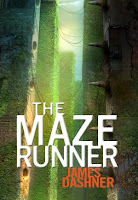 Alice took me a little time to warm up to. I spent the first half of Alice, I Think gritting my teeth at her intense self-centredness and wanting to shake some sense into her. Part of my pain may have been influenced by the recognition that at age fifteen I was probably only a little less selfish and reactive than her.
Alice took me a little time to warm up to. I spent the first half of Alice, I Think gritting my teeth at her intense self-centredness and wanting to shake some sense into her. Part of my pain may have been influenced by the recognition that at age fifteen I was probably only a little less selfish and reactive than her.  Alice cares too much about looking good, but has the most bizarre fashion sense that anyone in her town has ever seen. She has nothing in the way of social skills, which she blames on spending most of her life homeschooled, but may have as much to do with her near-complete absence of empathy. Alice has beyond-terrible judgement. She stalks customers at her workplace (convinced they're all shoplifters), freezes up when physically attacked by a drunken teen delinquent, and tells half-truths to her therapist so he doesn't have a breakdown like the last one did.
Alice cares too much about looking good, but has the most bizarre fashion sense that anyone in her town has ever seen. She has nothing in the way of social skills, which she blames on spending most of her life homeschooled, but may have as much to do with her near-complete absence of empathy. Alice has beyond-terrible judgement. She stalks customers at her workplace (convinced they're all shoplifters), freezes up when physically attacked by a drunken teen delinquent, and tells half-truths to her therapist so he doesn't have a breakdown like the last one did.By the end of Alice, I Think, I'd laughed hard enough and been sufficiently charmed to read the rest of the series. Miss Smithers, my favourite of the three, sees Alice competing in the local pageant and sabotaging herself at all turns. She spends most of her clothing-allowance for the contest on a pair of leather pants, leaving her almost nothing to cobble together the rest of her outfits. She publishes (somewhat unintentionally) scathing articles about friends, family, and fellow contestants in her zine. And sadly, with a combination of neglect and unreasonable demands, she chases away her endearingly awkward boyfriend. Alice Macleod, Realist at Last, continues with more romantic foibles, false representations to employers, and failure to complete a single act of housework.
All three books end fairly abruptly, but as the stories are character rather than plot-centric, I didn't mind too much. I would have liked to know a little more about what was happening with other characters, but this is Alice's diary, and Alice doesn't care enough to talk too long about anyone else. Sigh. I laughed enough that I'll forgive her.












